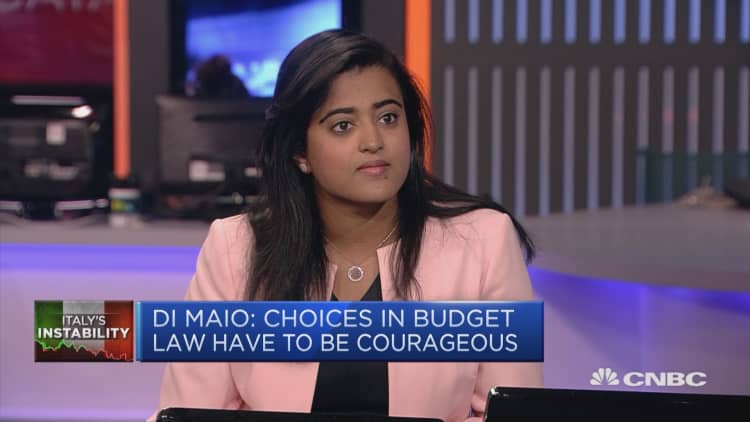The Italian spending plan for 2019 could be a boost for nationalist parties in the upcoming European elections, an analyst told CNBC on Monday.
The 2019 budget that the Italian government is due to present in the coming days has kept investors on their toes. There are wide concerns that the populist government will present a budget that will derail the reduction of Italy's public debt — a critical issue given that Rome holds the second largest pile of debt in Europe.
However, the spending plan could have broader consequences.
"I believe the result from the Italian budget will provide a boost to the nationalists across the bloc heading into next year's parliamentary elections in May," Stephen Gallo, European head of forex strategy at Bank of Montreal, told CNBC via email.
"I am already looking towards 2019 and the European parliamentary elections, and for a persistent political risk discount to remain embedded in the euro," he said. "No matter how the Italian budget negotiations progress from here, my thinking is that Brussels will come out looking worse than it already does."
National budgets are determined by capitals across Europe, but the European Commission analyzes each individually and rules whether it complies with its fiscal rulebook.

However, the European Commission has previously shown that there is leeway in how fiscal rules are applied. This means that it could take two approaches to Italy's next budget: either Brussels will criticize the plan for increasing public spending, and for putting in danger the reduction of public debt; or the European Commission will approve a "looser fiscal path" for the Italian economy.
"If the Commission approves a looser fiscal path for Italy and the Italian government is able to deliver a better growth environment for the country over the medium-term, Brussels will also look bad because many people will ask why the Commission didn't allow countries to deviate from the fiscal rule sooner in order to improve the growth environment," Gallo said.
European citizens will vote next spring on new lawmakers for the European parliament. This election will prove critical for the future of Europe as well as for financial markets given the shift in power seen in recent national votes.
Italy, France, Germany and the Netherlands are some of the countries where voters showed an increasing support for nationalist movements and populist parties.
"The balance of power has been shifting away from European centrists and federalists towards nationalists, and this process has potentially huge implications for the bloc," in terms of its governance, Gallo said.
He added that "political fragmentation that yields financial fragmentation is a serious downside risk to the euro and asset prices."
Other analysts argue that there are several factors playing into next year's vote.
"I'm not sure there is any clear connection between the 2019 Italian budget and the EU election outcome. So many variables in the latter that would overshadow Italian budget issues," Erik Nielsen, chief economist at UniCredit, told CNBC in an email.
Finance minister under pressure
Meanwhile, Giovanni Tria, Italy's economy and finance minister, is under pressure to deliver the government's spending promises. He has been asked to make fiscal room to accommodate plans to set up a citizens' income and tax reductions.
However, Tria, who doesn't hold a political affiliation with either of the two coalition parties, has vowed to respect the European fiscal rules.
"We expect the budget to target a deficit of close to 2 percent of GDP, and if so, markets ought to welcome that, correcting the recent additional concern over an excessive deficit to fulfill all their promises – and with that, I would expect a further tightening of spreads," Nielsen also said.
Tria is expected to present formal targets for economic growth and debt on Thursday.


